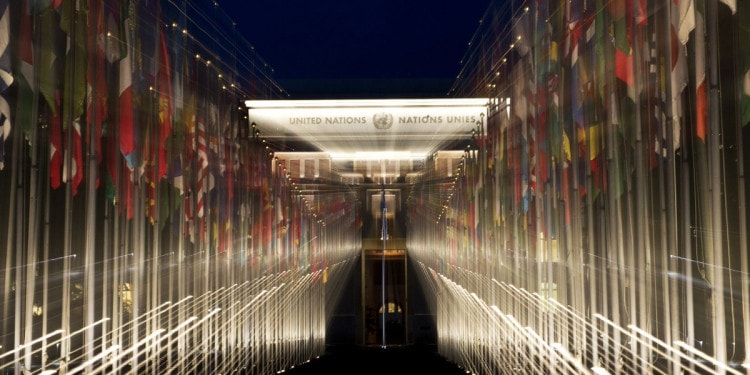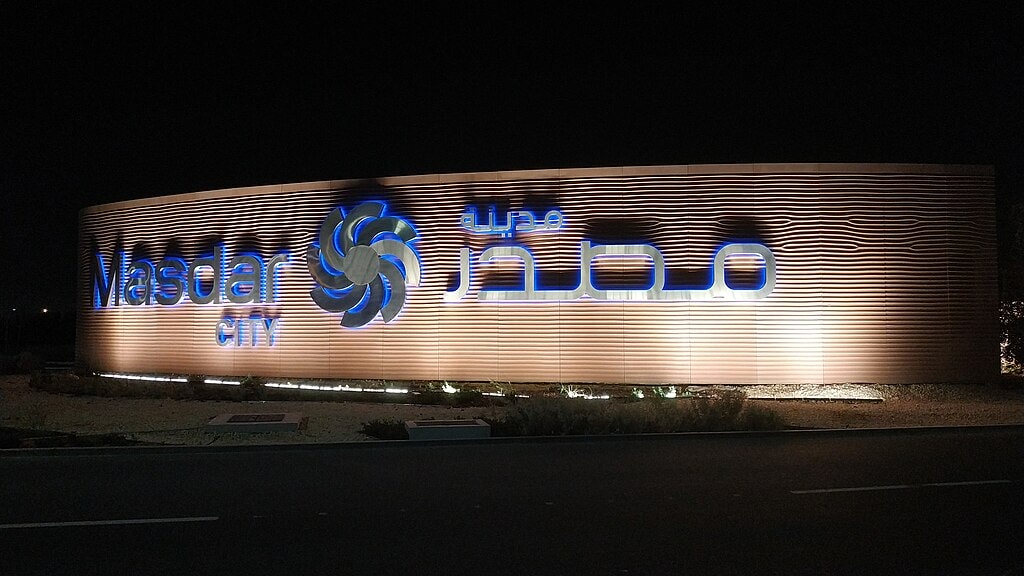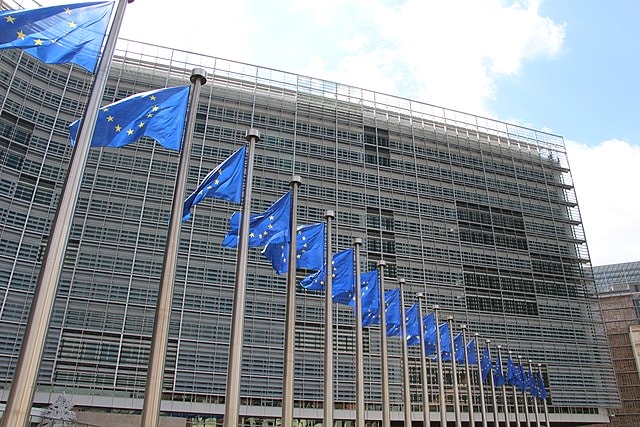Last month, we wrote about this year’s SDG Finance Summit in Geneva, a UNDP initiative, as an innovation springboard “bring[ing] together high-level decision makers to forge partnerships for the implementation of the Sustainable Development Goals (SDGs).”
We introduced 12 of the 20 finalist startups pitching their products and services at the summit — the 12 that had been selected through the first Growth Stage Impact Ventures (GSIV) for SDGs — and looked at the other actors that would have found themselves among the 300 participants attending the event (impact investors, development finance actors, Fortune 500 representatives and, among others, development agencies).
With Impakter as one of the summit’s implementing media and tech partners, I was invited to attend the 2019 summit in Geneva and introduce its concept to our audience, share tweets and thoughts, take some photos and, well, network myself.
Having happily accepted, I flew to Geneva, Switzerland, and, on Oct. 9, 2019, just before the clock turned 8 a.m., I walked into the Forum Geneve for what was going to be my first time attending the SDG Finance Geneva Summit, in its fourth edition.
The event, structured around three panel sessions, two pitching sessions for impact ventures and a series of workshops, kicked off with welcome coffee and registration. The people coming in laid down their coats and umbrellas, picked up their name badges and started making their way toward the two separate and simultaneous breakfast sessions in the Forum’s Salle Donghai and Salle Akashi.
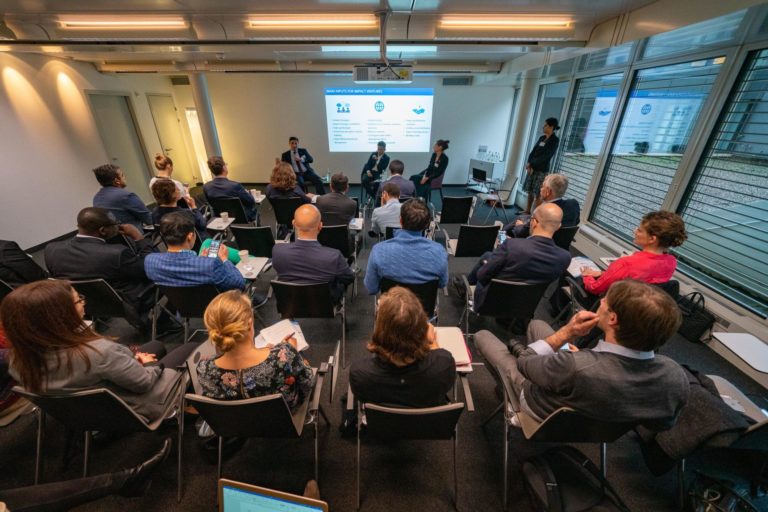
One of the two sessions, namely, “Breakfast: Boosting SMEs Acceleration Efforts in Developing Countries,” summarized the UNDP’s efforts to accelerate impact ventures, social enterprises and other organizations in emerging markets whose work aims to tackle the SDGs.
Two speakers and one moderator, among which were the UNDP’s Private Sector Advisor and Head of SDG Accelerator Mrs. Stine Kirstein Junge and Mr. Artak Melkonyan, CEO of UNDP SDG Innovative Finance (UNSIF), shared some of their experiences running impact accelerator programs and their plans to expand the network of impact accelerators around the world.
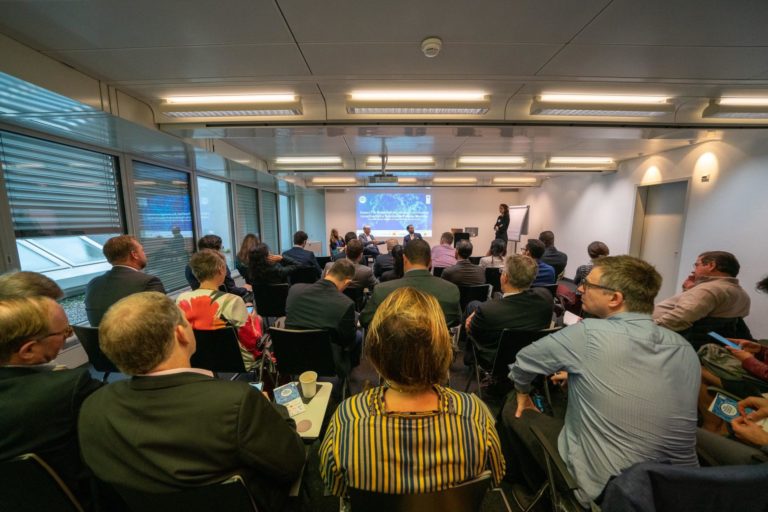
At the other breakfast session, “Impact for Breakfast: Increasing Commercial Investments for Nutrition in Frontier Markets,” the speakers discussed nutritious food, offering insight into nutrition investments as well as into two projects (by GAIN and the Hivos Food & Lifestyle Fund) that aim to connect investors hoping to invest in agri-food with innovators in the nutrition industry searching for investment.
The breakfast sessions were followed by the opening remarks, in the Forum’s Auditorium Galata, by Maria Luisa Silva, Director of UNDP Geneva, Arancha Gonzalez, Executive Director of the International Trade Centre and Alexandre Epalle, General Director of the State of Geneva.
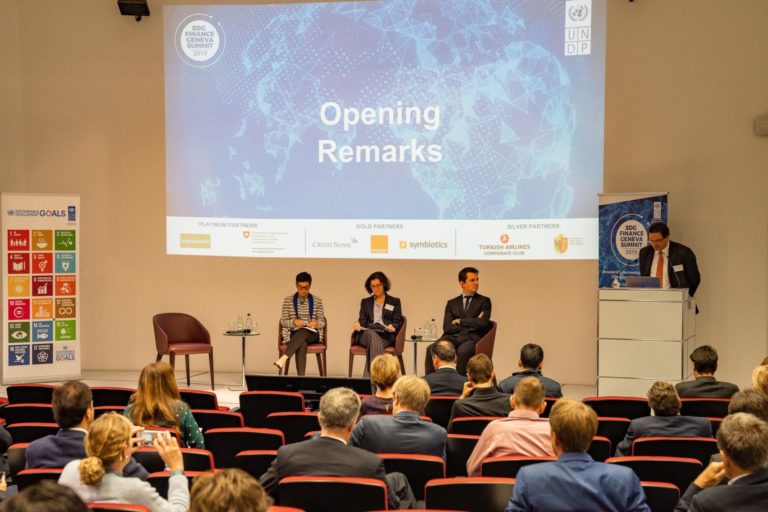
“The purpose of this summit,” Maria Luisa Silva began introducing the summit after the participants had been welcomed, “is to promote SDG compatible investments that will enable the transition to a more just and healthier world, and this is what the SDGs are all about.”
“And what we are going to be doing throughout the day,” she went on, “is exploring the opportunities, but also the challenges, to move towards that path, and also to showcase, through innovation and through the work of entrepreneurs in developing countries, that doing good and doing well is really possible, is possible not only in the philanthropic manner, but is also possible in a business manner.”
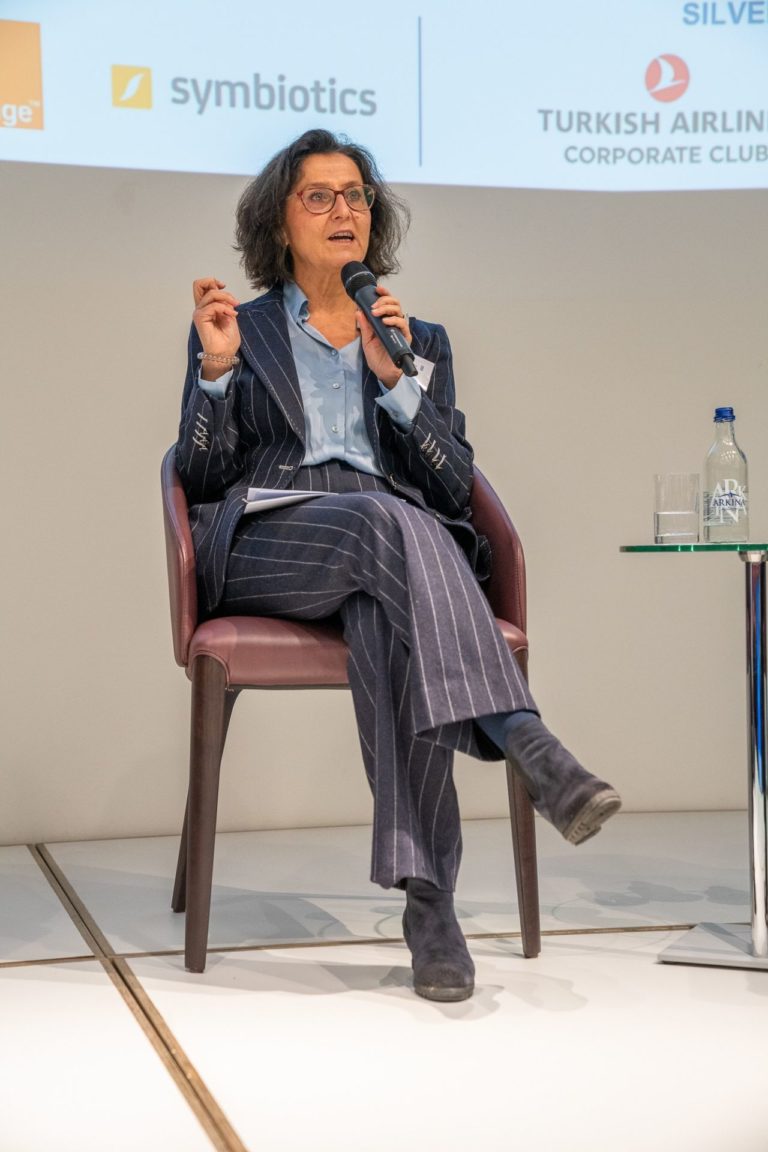
The first Panel of the summit, “Lessons learned from Startup to Unicorn,” also taking place in Auditorium Galata, began immediately after the opening remarks. The panelists, which included entrepreneurs Brian Warshawsky and David Bermeo, spoke about their work and its impact on low-income population segments, delving into the present startup landscape and its likely future.
When asked to share tips to entrepreneurs with regard to growing their business and using social capital, CEO of Fenix International Brian Warshawsky mentioned “being close to the customer, not only for us as the company, but the investors as well; having on the ground presence and understanding of the markets; [and making] sure that the entire team, not just the management team, is incentivized in the success of the company.”
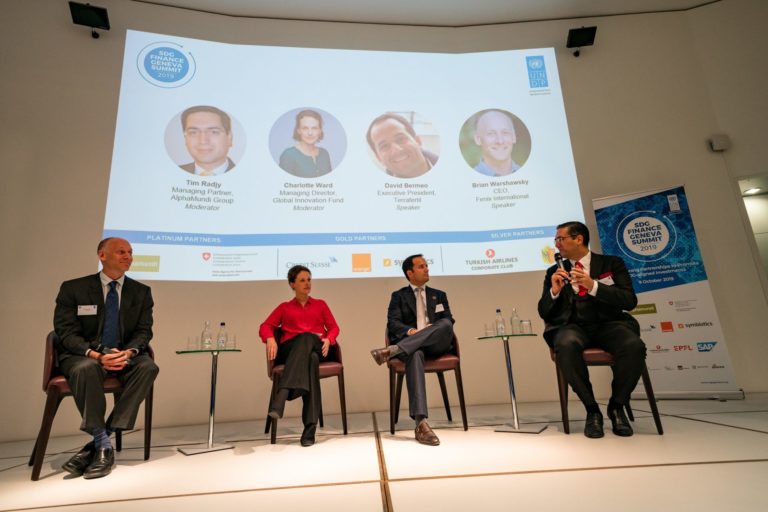
Brian went on to share an example of how, at the time of Fenix International’s acquisition, “100% of the employees, including the cooks and the cleaners and the security guards, all benefited from that,” and how this allowed them to “all be working in the same direction all across the departments.”
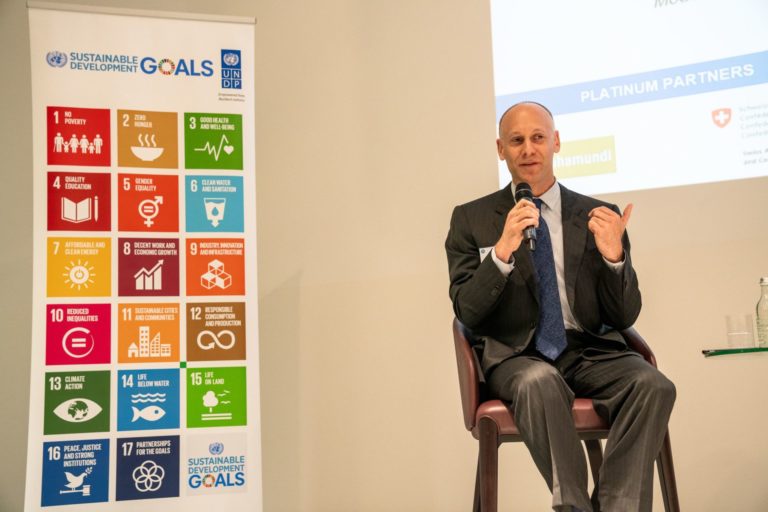
The end of this discussion, inspiring and encouraging in a number of ways, transitioned into the beginning of the two pitching sessions. These sessions, named “Pitching Session A” and “Pitching Session B,” involved four sessions each, all taking place in different rooms and in parallel to one another, with several entrepreneurs pitching their products and services at each of these sessions.
Separated by a 30-minute coffee break, pitching sessions A and B practically involved the same pitches, only in different rooms and with different moderators, the idea being to allow participants to attend more sessions as many of took place simultaneously.
The GSIV finalists, introduced in our earlier piece and split into three categories, involved the following entrepreneurs across the following themes:
I. Access to Health
Asher Hasan, Founder and CEO of Naya Jeevan
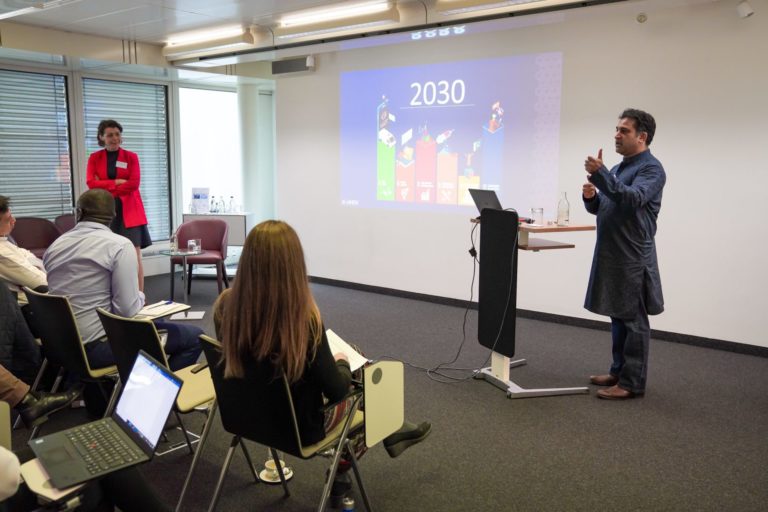
Felix Kimaru, CEO of TotoHealth
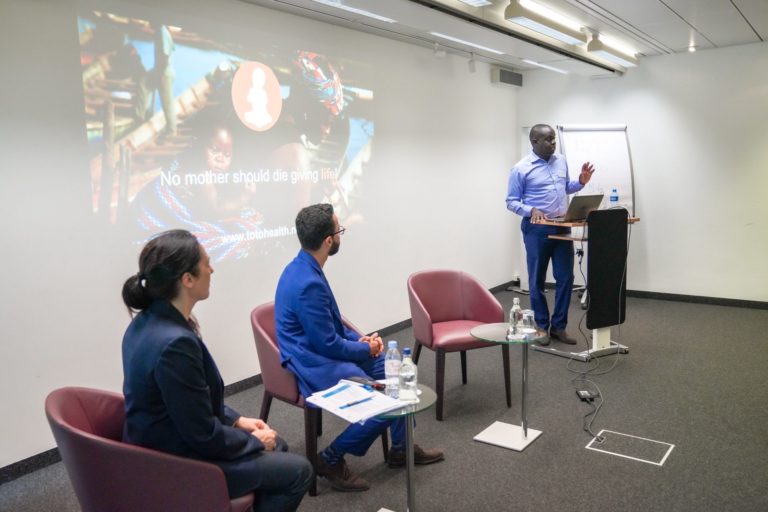
Colleen Lyon, Chief of Staff at ayzh Health
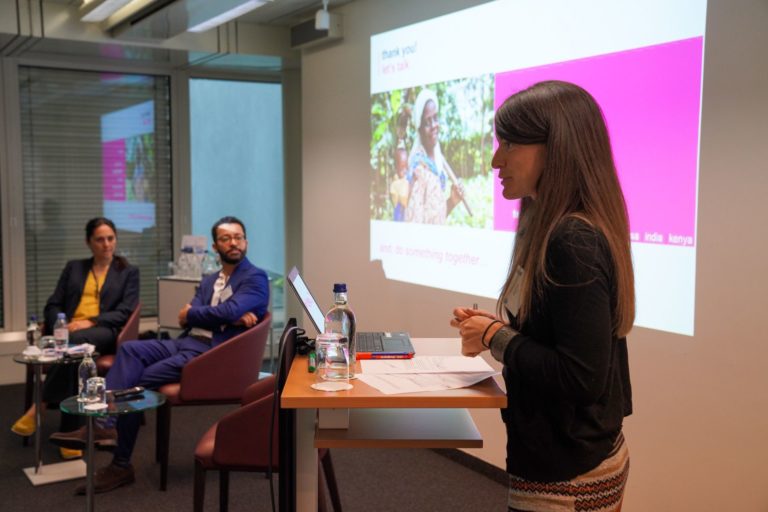
II. Climate Data & Energy
Ajaita Shah, Founder and CEO of Frontier Markets
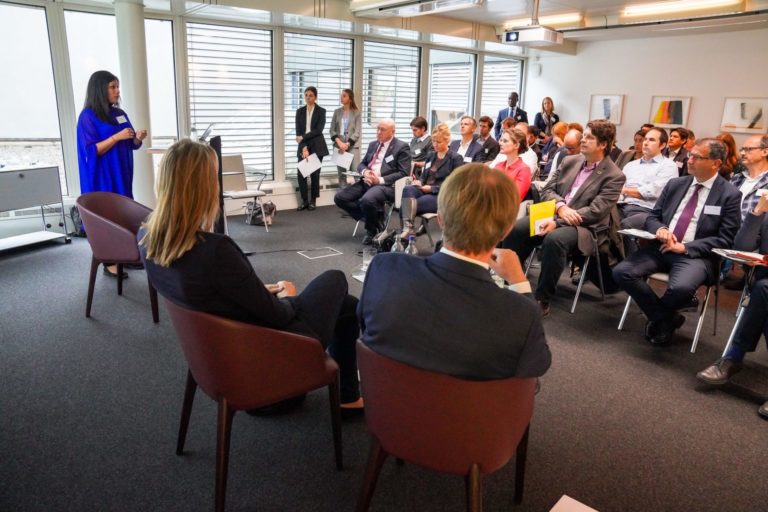
Liisa Smits, CEO of Ignitia
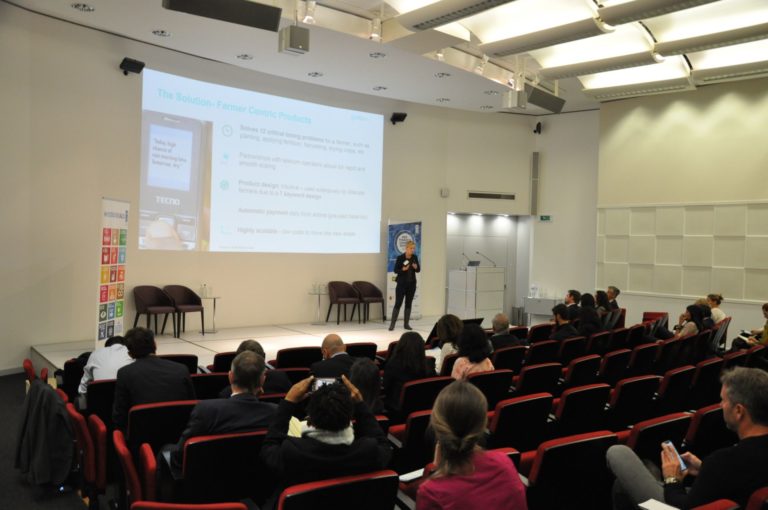
Aleksander Eaton, Founder and CEO of Sistema.bio
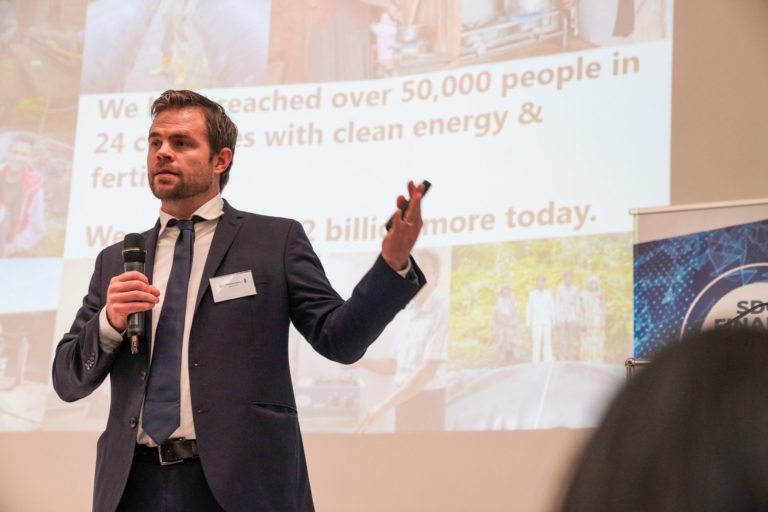
Rosemary Pierce-Messick, Executive Director of Three Wheels United
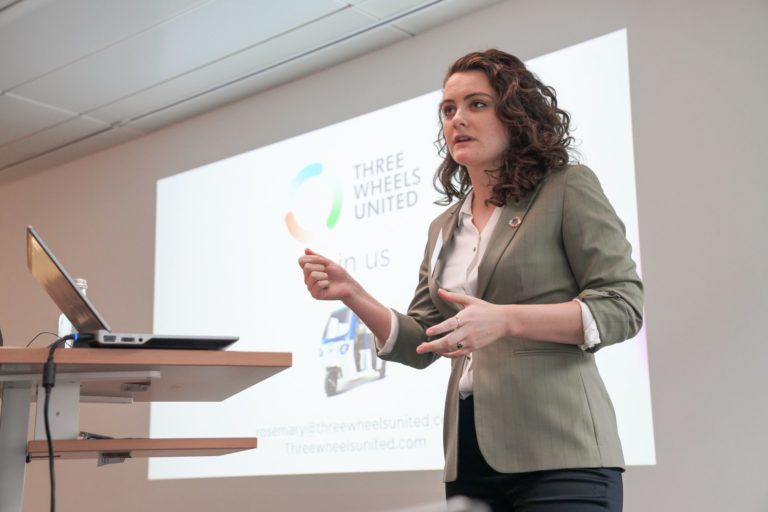
III. Financial Services
Andi Taufan Garuda Putra, Founder and CEO of Amartha
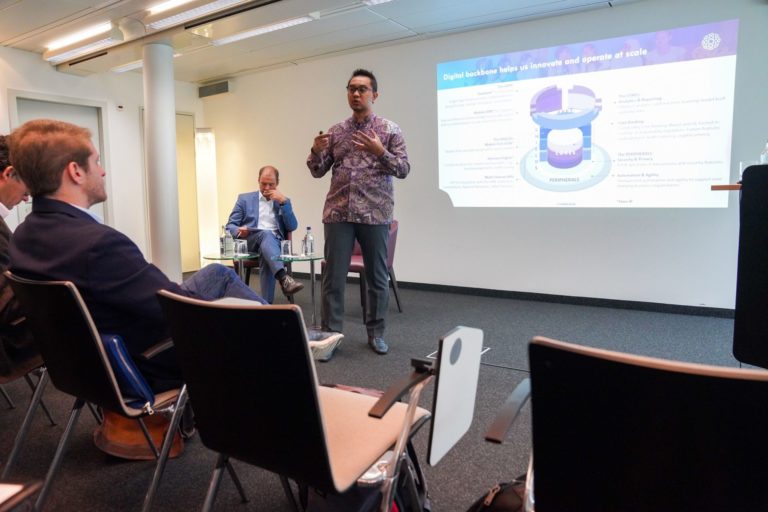
Gowri Thyagarajan Mukherjee, Co-Founder of CreditMantri
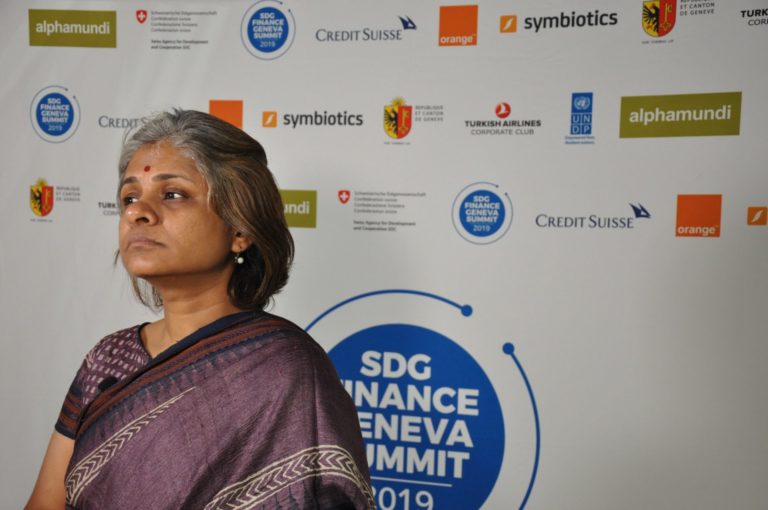
Justin Sykes, Board Member at KIMS Microfinance
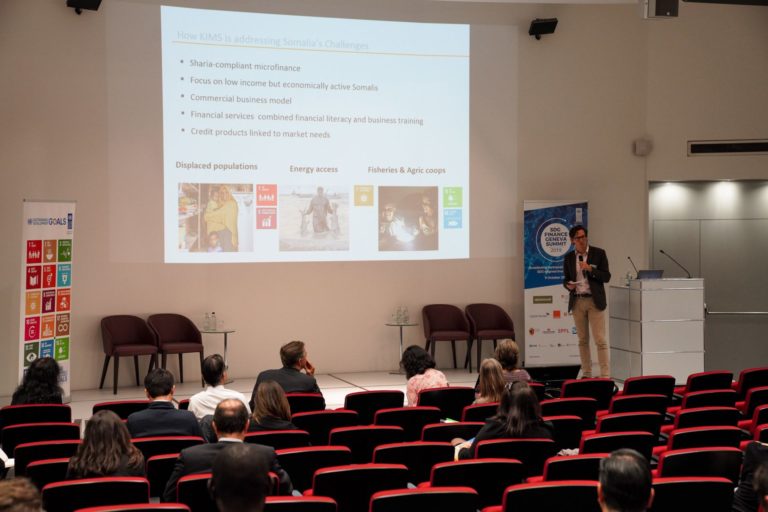
Of the remaining 11 finalist startups, 10 had been selected through the Accelerate2030 initiative and one through the “Orange Innovative Venture Boost” program. Below are their founders, CEOs, or representatives, as well as their missions and goals, in brief.
Samuel Odunaya, Operations Manager at Impact Water Nigeria
Impact Water’s (Nigeria) “mission is to provide safe drinking water to every school child in Nigeria.” 💧- Samuel Odunaya, Senior Manager at Impact Water @impactwaterngr #SGSGeneva pic.twitter.com/dazhbrN5ed
— Accelerate2030 (@accelerate2030) October 9, 2019
Milos Mirković, Marketing Manager at Ekofungi
EkoFungi (Serbia) uses an innovative #circulareconomy model to “produce high quality food from local waste.” – Milos Mirkovic, Marketing Manager, EkoFungi #SGSGeneva pic.twitter.com/jAGvAH66Lu
— Accelerate2030 (@accelerate2030) October 9, 2019
Muhammad Fauzal Rizki, CEO of Sampangan
Sampangan (Indonesia) “repurposes waste in a “magic box” that transforms waste into active carbon, which can then be used in agriculture.” – Muhammad Fauzal Rizki, CEO, Sampangan. Learn more about their model on our website! #SGSGeneva pic.twitter.com/83qdI0ARfe
— Accelerate2030 (@accelerate2030) October 9, 2019
Duygu Yilmaz, Co-Founder and CEO of Biolive
BioLive (Turkey) “produces bioplastic granules from olive seeds that reduce CO2 emissions in a sustainable way.” -Duygu Yilmaz, CEO & Co-founder @Biolivearge #SGSGeneva pic.twitter.com/dcBFwfBOLI
— Accelerate2030 (@accelerate2030) October 9, 2019
Rafael Figueroa, Founder and CEO of Portal Telemedicina
At Portal Telemedicina (Brazil), “our goal is to use our diagnostic platform to impact 1 billion patients in the next year.” – Rafael Figueroa, Founder & CEO @portaltelemed #SGSGeneva pic.twitter.com/4r7uin9WpG
— Accelerate2030 (@accelerate2030) October 9, 2019
Maria Laura Mendoza, Chief Product Officer at Unima
Unima’s (Mexico) “goal is to provide timely & low cost health diagnostics regardless of one’s location or ability to pay.” – Laura Mendoza, Chief Product Officer, Unima. @Unima_ #SGSGeneva pic.twitter.com/0mNQcMvfjH
— Accelerate2030 (@accelerate2030) October 9, 2019
Maria Diaz Like, Co-Founder of AgroCognitive
“AgroCognitive (Venezuela) is making farming activity sustainable again.” – María Victoria Diaz, Co-founder of AgroCognitive. @agrocognitive #SGSGeneva pic.twitter.com/sNGYtC1Q8n
— Accelerate2030 (@accelerate2030) October 9, 2019
Alejandro Ortega, Co-Founder and CEO of Costa Rica Insect Company
Costa Rica Insect Company is “changing the world by creating the food of the future.” 🌎- Alejandro Ortega, Co-founder & CEO, CRIC @CRInsect #SGSGeneva pic.twitter.com/h5Kmkcaxwo
— Accelerate2030 (@accelerate2030) October 9, 2019
Mauricio Schneider, COO of SoluBio
At Solubio (Brazil), “we aim to save the planet and preserve future generations by eliminating the use of pesticides in agriculture.” – Maurício Schneider, COO, SoluBio. @solubiotec #SGSGeneva pic.twitter.com/pdDS9Gbc25
— Accelerate2030 (@accelerate2030) October 9, 2019
Ronald Replan, Co-Founder and VP-Product of InvestEd
InvestEd (Philippines) envisions a “world where every young person has the opportunity to fulfil their dreams.” – Ronald Replan, VP of Product, InvestEd #SGSGeneva pic.twitter.com/Ks2WMwuvKn
— Accelerate2030 (@accelerate2030) October 9, 2019
Samba Sow, CEO of Sudpay
Samba, CEO of #Sudpay 🇸🇳, that connects informal businesses to financial institutions for tax collection purposes just pitched his project at #SDG Finance Geneva Summit #SGSGeneva 🇨🇭! Another great example of #TechForGood !
@m4dSMAm4d @IBigourdan @orangeafrica @ThTaboy pic.twitter.com/LDq3W6q3Ze— AFIDBA (@AFIDBA_) October 9, 2019
Having begun as soon as the pitching sessions had ended, the summit’s second panel evolved around redirecting mainstream capital flows to SDG-aligned investment. The speakers analyzed the potential that lies in the private sector and its resources, and how these could be exploited to generate impact and contribute to the SDGs by being steered toward SDG financing as opposed to mainstream financing.
Director of UNDP’s SDG Impact Initiative Elizabeth Boggs Davidsen, a speaker at the panel, identified two “sort of barriers that [they] understood across the board from all different investors that were really inhibiting more capital flowing towards the achievement of the goals.”
One barrier was that, while the investors would like to allocate their capital and while they do think that the SDGs are important, they “really don’t know how to do that and would like some guidance on how to do that.”
The second, said Elizabeth, was that “there is no market intelligence,” and that “there is very little information, particularly when you’re talking about emerging markets,” and “nothing really to help you understand where there are investment opportunities that really align and respond to the SDGs.”
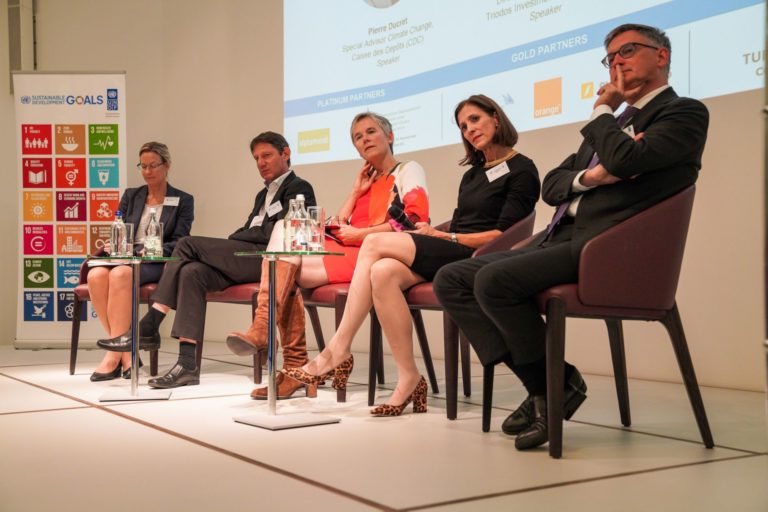
Upon returning from the networking lunch break, which directly succeeded panel two, participants faced a choice between networking and “speed dating” with the entrepreneurs, attending a UNDP/SAP session in Salle Akashi or going to one of the several workshops (on “Gender Lens Investing,” “SDG Investing & Exiting in Frontier Markets” or on “Impact Management and Measurement & Boosting SMEs Acceleration Efforts in Developing Countries”).
At the UNDP/SAP session, with UNDP Private Sector Hub’s Deputy Director Mr. Sahba Sobhani as moderator, SAP’s Jesper Schleimann introduced the SDG Impact Dashboard, launched in partnership with the UNDP as part of the Beyond Tomorrow Program with the goal to “provide real time indicators monitoring, inform decision-making and support large corporates progress towards the achievement of the SDGs.”
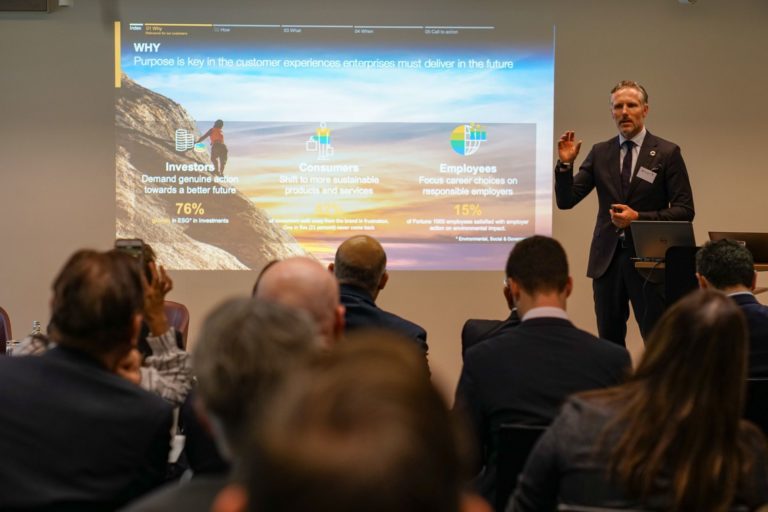
The participants who had chosen to follow this session and who had thus found themselves in Salle Akashi, filled to its maximum capacity, listened to Mr. Schleimann present the first prototype of the dashboard, focused on the Gender Pay Gap, and elaborate on the program’s customer-centric approach as well as its benefits to large corporations.
If we can’t measure it, we can’t improve it.
— Jesper Schleimann
To quote Jesper interpreting a quote by Peter Drucker when emphasizing the importance of having concrete and tangible measurement methods, “If we can’t measure it, we can’t improve it.”
The next round of sessions, last before the second coffee break, involved bilateral meetings with entrepreneurs, a Symbiotics workshop in which the organization’s heads, advisors and analysts shared their “expertise on impact investing in emerging and frontier markets through private debt,” and a panel on “Harnessing Digitalization in Financing of the Sustainable Development Goals.”
As part of the latter, Co-Chair of the Secretary General’s Task Force on Digital Financing of the SDGs Simon Zadek presented the task force’s results.
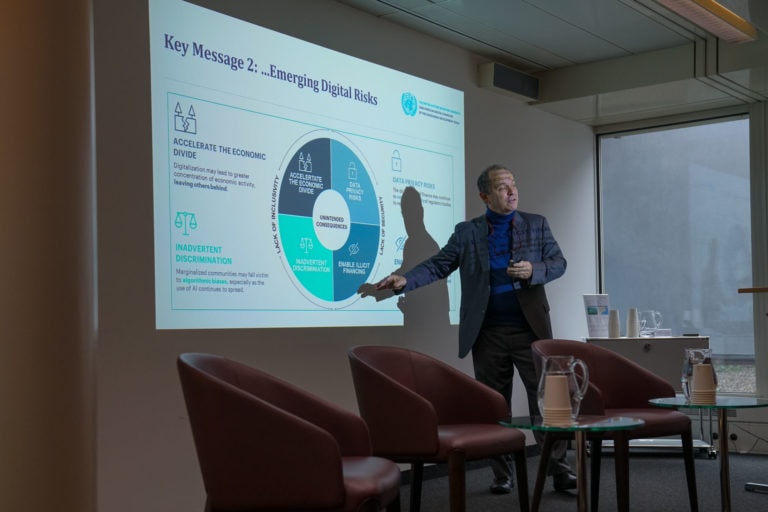
The third and final panel at this year’s SDG Finance Geneva Summit carried the title, “Ten years of impact finance industry, in the context of the SDGs, what lies ahead?”
The panel, with Director of the UNDP Bureau for External Relations and Advocacy (BERA) Ulrika Modeer as moderator, brought together various industry leaders to examine the progress made in the impact investing sphere thus far, as well as the development of that progress over the past decade and its possible development throughout the decade to come.
With practically all of the summit’s attendees now in Auditorium Galata, Ulrika Modeer opened the panel: “10 years have passed, as we know, since philanthropists and investors introduced the financial services industry to impact investing. And while we have seen that both the interest and the sector as such has significantly grown and matured, it still represents only 0.1% of total assets managed.”
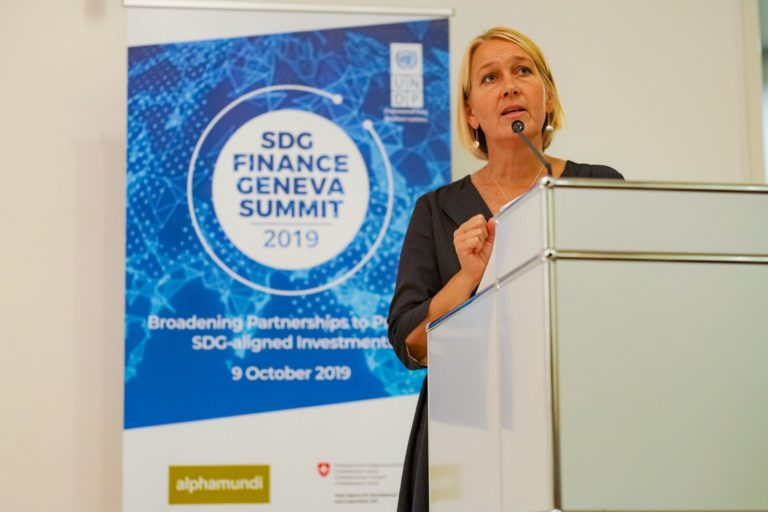
“We all know,” Ulrika continued, “that the introduction of the Sustainable Development Goals shows us that there is an urgency to look into how we create a sustainable future, and that that sustainable future cannot be created by the UN or any governments alone, but that we actually need both the intelligent ideas and also the capital in order to make those promising and ambitious goals a reality for people, and, I must also say, for the planet.”
We have demonstrated that you can combine profit and purpose, and that you don’t necessarily have to sacrifice financial returns to do something socially and environmentally positive.
— Jean-Philippe de Schrevel
Answering a question about the sector’s key achievements, Founder and Managing Partner of Bamboo Capital Partners Jean-Philippe de Schrevel said that “we have demonstrated that you can combine profit and purpose, and that you don’t necessarily have to sacrifice financial returns to do something socially and environmentally positive. So that, I think, is a great contribution. We can do this, it is possible.”
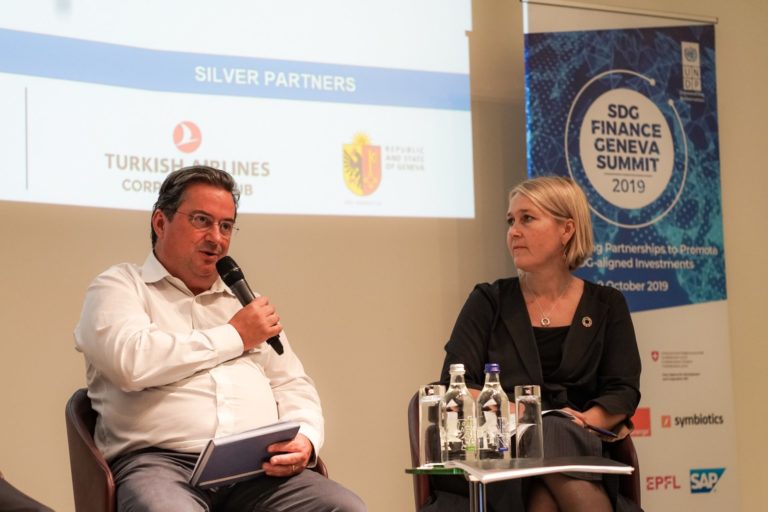
He went on to add another two achievements, namely that micro-finance has shown that we can actually scale solutions that have been developed at the grassroots level, and that “we are now seeing the increased interest of many different types of investors. When you see names like KKR, TPG, Goldman Sachs, Blackrock talking about impact investing, well, you know, that’s a sign that things are moving. I’m not sure that there is content behind this yet, but at least it’s a sign that they feel compelled to talk about it. There’s no smoke without fire, as we say in French.”
When asked to share her thoughts on the role of millennials in impact finance, Managing Director at Toniic Kanini Mutooni mentioned a survey conducted amongst their members a couple of years ago, and how “the first thing that came out was that a lot of millennials immediately identified with being an impact investor. There wasn’t any question of am I or am I not, it was an immediate response: yes, I deploy my capital to make financial returns and to make a positive environmental and social return. Very, very clear cut.”
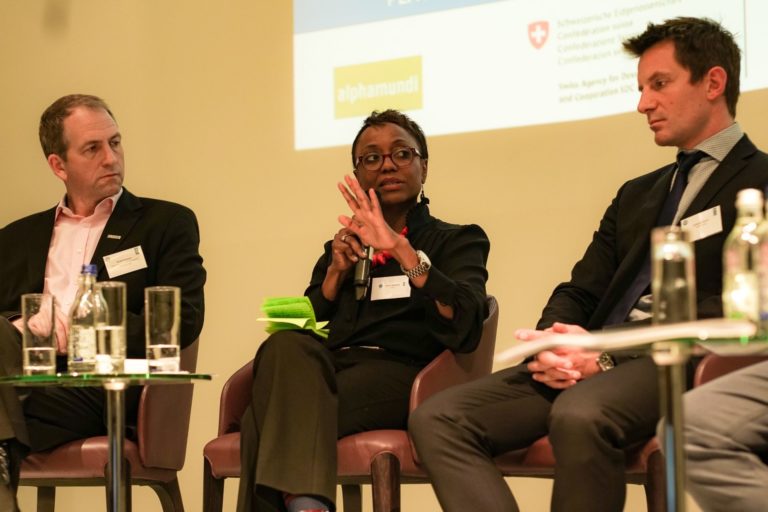
Referring to the sector’s challenges, Randall Kempner, Executive Director at the Aspen Network of Development Entrepreneurs, said the following: “I want to say something which I hope is both obvious and controversial at the same time. What I want to say is, to scale impact investing, the biggest challenge is not about the lack of capital. To repeat, it is not about the money. Money is one of the most fungible, tradable, transferable objects that we know — in a few seconds, in a few clicks, money can go anywhere. So if it’s not about the money, what we believe is that it is about investable deals.”
He then raised the question of why, when in fact there is plenty of money, it isn’t being invested into small and growing businesses, and answered that “a lot of it has to do with this term investable.”
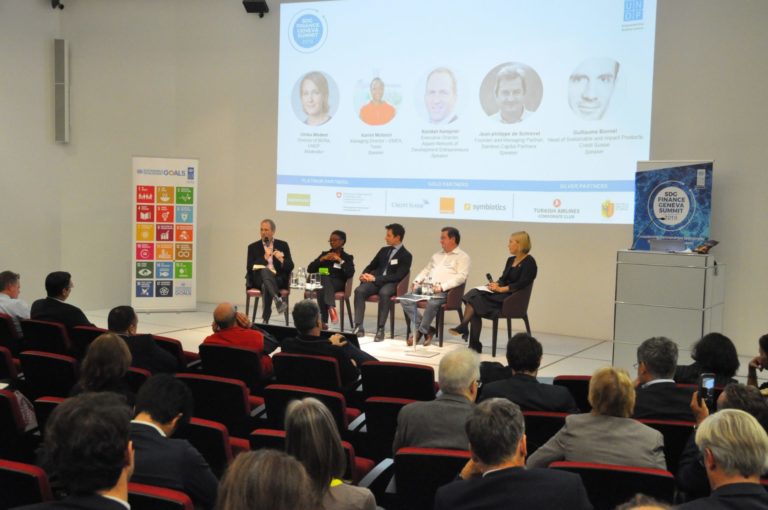
“What makes a company investable?” Randall began elaborating on his answer. “Why is that? On the one hand there are in fact some really, really good companies that are not getting funded because investors are too risk averse. We heard Claude from Obviam mention that, indeed, there’s an overestimation of the risk and an underestimation of the potential return for small and growing businesses in emerging markets.”
Mr. Kempner concluded by saying that the number one challenge that we need to address is the lack of talent, not the lack of money, emphasizing that, in order to scale impact investing, we need to “figure out how to attract, retain and develop particularly mid-and-senior level managers for small and growing companies”— people who otherwise tend to either follow the trend of moving from the global south to the global north, or who are, as Randall said, “much more likely to work for a big company, an international NGO, or the UN, than they are to work in a small and growing business,” in cases where they remain in emerging markets.
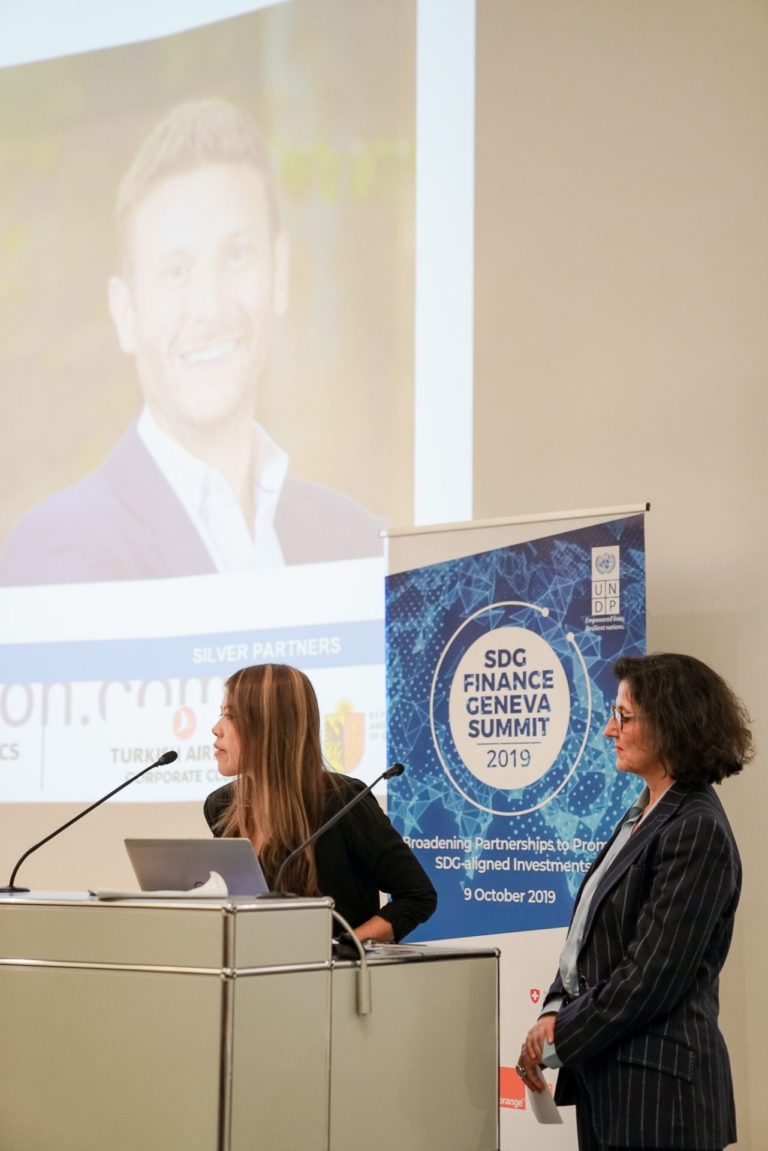
The closing ceremony, likewise in the Forum’s Auditorium Galata, began with I-DEV International’s Africa Director Patricia Chin-Sweeney thanking the sponsors of the event and presenting the three GSIV finalists, in each of the categories, running for the Jason J. Spindler Big Data for Impact Award.
These included Naya Jeevan (Health), Three Wheels United (Climate & Energy), and CreditMantri (Financial Services). After briefly summarizing the work of these startups, Patricia opened the envelope and announced the winner. It was CreditMantri
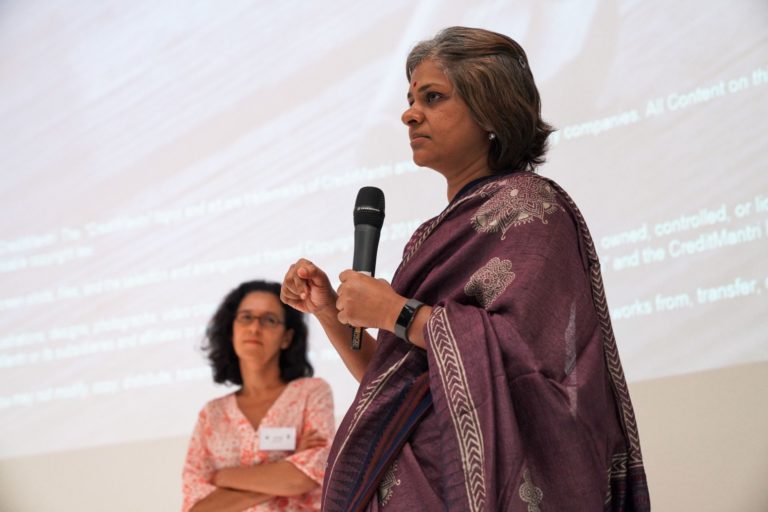
The summit ended with some of the key participants sharing firm commitments on “actions they will take on the way forward on SDG financing,” followed by one speech by Tatjana von Steiger Weber, Global Cooperation Deputy Head at the Swiss Agency for Development and Cooperation, and another by Ulrika Modeer, Director of the UNDP BERA.
Among the stakeholders expressing their commitments was Tim Radjy, who said: “I think it’s super important, now that we have the challenge of the 2030 agenda, to move to action. We cannot delay it any longer. My commitment for 2020 is that AlphaMundi is going to invest 20 million dollars in new companies across Latin America and Africa, and we’re also going to pursue our collaboration effort with the UNDP in order to educate and mobilize Swiss institutional investors.”
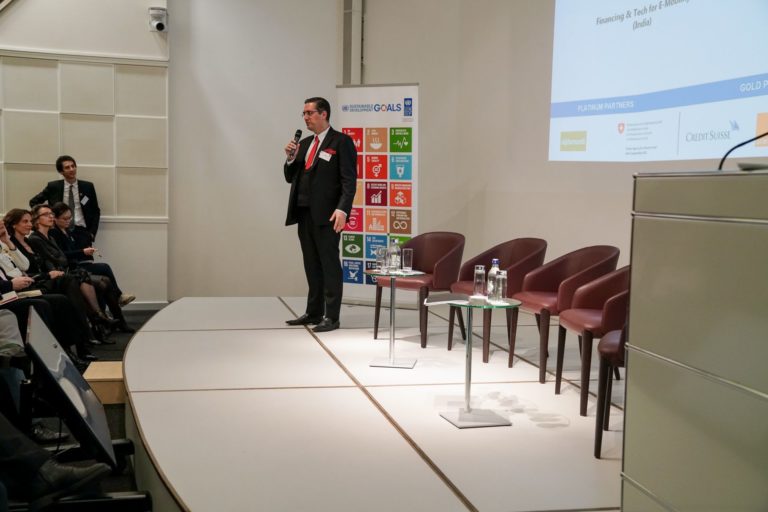
[W]e need to think more transdisciplinary, more cross-sectorally, and in partnerships. The 2030 agenda requires it, and the public demands it.
— Tatjana von Steiger Weber
“There are a lot of challenges on all sides,” Tatjana von Steiger Weber declared as part of her speech after the various stakeholder commitments had been expressed, “both development and finance, which we need to transcend to make deals; we need to transform our thinking and think big, we need to think more transdisciplinary, more cross-sectorally, and in partnerships. The 2030 agenda requires it, and the public demands it.”
She concluded by stating that “today’s SDG Finance summit and the Building Bridges Week creates a platform for those actors that act, that test and dare to take risks. In the midst of all that is happening, let the spirit continue. Once again, thanks to all the organizers, and see you all next year.”
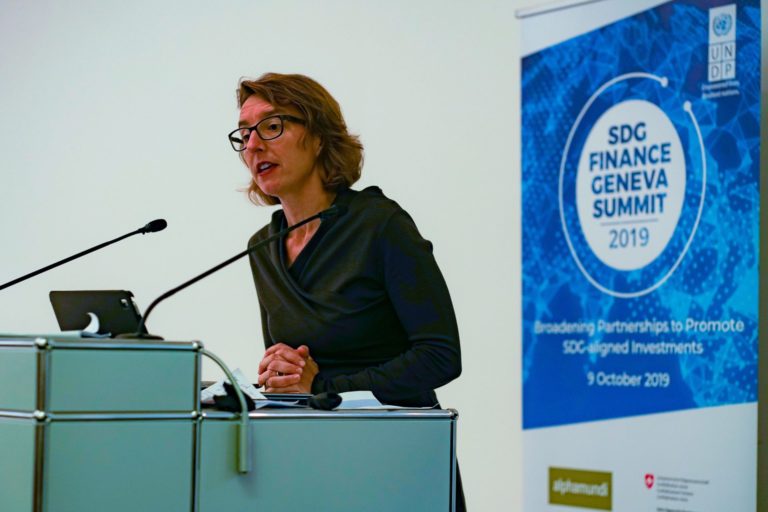
Editor’s Note: The opinions expressed here by Impakter.com columnists are their own, not those of Impakter.com — In the Featured Photo: Co-Founder of CreditMantri Gowri Thyagarajan Mukherjee at the closing ceremony of SGS Geneva 2019 — Featured Photo Credit: UNDP Geneva


